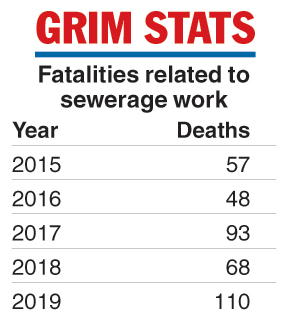The 2020-21 Union budget has set aside the same amount allocated last year for rehabilitating manual scavengers, although 2019 recorded the highest number of fatalities among sewerage workers in recent years, prompting experts to question if the government was serious about addressing the scourge.
Finance minister Nirmala Sitharaman last week allotted Rs 110 crore for the Self Employment Scheme for Rehabilitation of Manual Scavengers for 2020-21.
The Narendra Modi government had set aside the same amount for the year 2019-20.
The grim facts about workers involved in manual cleaning of sewers became evident when Ramdas Athawale, minister of state for social justice and empowerment, submitted a written reply in the Rajya Sabha.
Athawale gave year-wise statistics about deaths of people engaged in sewerage work in the country over the past five years.
While the year 2015 recorded 57 deaths, the number nearly doubled to 110 in 2019 — the highest in five years.
A survey conducted by the National Safai Karamcharis Finance and Development Corporation (NSKFDC) has identified 45,000 manual scavengers in 170 districts across the country.

The Telegraph
A survey is on for another 24 districts, an official in the social justice ministry said.
A law Parliament passed in 1993 had banned manual scavenging but it did not have any penal provision to punish those who hire people for such work.
In 2013, Parliament passed the Prohibition of Employment as Manual Scavengers and Their Rehabilitation Act, which said engaging a person as a manual scavenger was an offence that could lead to a year in jail or a fine of Rs 50,000, or both. But nobody has been convicted under this law so far.
Under this law, manual scavengers must be identified and given an immediate assistance of Rs 40,000 each. They should later be trained for a job, according to their area of interest, and given a low-interest loan of up to Rs 15 lakh each to start a new venture.
Sitharaman, in her speech, said the government would provide mechanised facilities to prevent deaths in sewer lines.
Magsaysay Award winner and social activist Bezwada Wilson said people were dying in large numbers because of lack of such mechanised facilities.
“The finance minister in her last year’s budget speech said mechanised facilities would be provided to stop manual scavenging. The allocation was Rs 110 crore. No mechanisation has been done. Now the same amount has been allocated. There is no political will to save the lives of manual scavengers,” Wilson said.
Wilson said there was no focus on rehabilitating manual scavengers with alternative jobs and loans, and the Rs 110 crore that was allotted has been mainly spent on paying one-time compensations to newly identified manual scavengers and some training.
An official of the social justice ministry said a national action plan was being prepared to ensure mechanised cleaning of sewer lines and safety tanks.
“The national action plan is under preparation. The government can allocate an additional amount in the supplementary budget for this purpose,” the official said.










